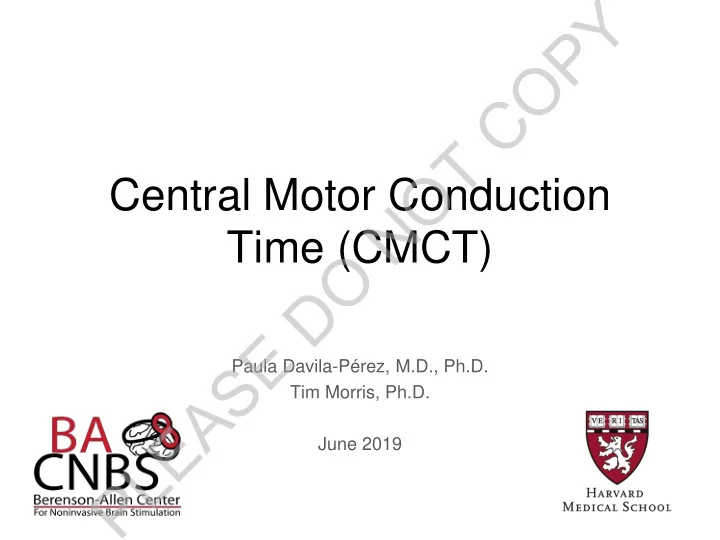

Y P O C T O Central Motor Conduction N Time (CMCT) O D E S Paula Davila-Pérez, M.D., Ph.D. A Tim Morris, Ph.D. E June 2019 L P
Y P O Outline C T O • Physiological and technical aspects N O • Clinical applications D E • Hands-on! S A E L P
Y P O Definition of CMCT C T O N Time taken for neural impulses to travel through O central nervous system on their way to the D target muscle. E S A E L P
Y P O C T O N O D E S A E L P
Y P O C T O N Spinal (b) O Stimulation D E S A E L P
Y P O C T O N O D E S A E L P
Y P O C T O N O D E S A E L P
Y P O C T Method 1 O N O D E S A Method 2 E F wave + M wave -1 peripheral L = time (ms) P 2 Kobayashi and Pascual-Leone 2003
Y P O • Stimulation of the roots: (TMS) C – Excites the roots at foramina T • Overestimation of CMCT O – Lower limbs may be difficult to assess N O • F-Waves method: D – Assumes conduction is normal at proximal E segments (Guillain-Barre S.) S – Proximal muscles or muscles with no F-waves A may be difficult E – More accurate L – Needs 2 stimulators P
Y P O IFCN Guidelines (http://www.ifcn.info/) C T O N O D E S A E L P
Y P O • Longer conduction time C • Dispersed and more attenuated responses T O • Low amplitude or no responses N O D E S A E L P Udupa & Chen. Handbook of Clinical Neurology. 2013
Y P CMCT and Diseases O C T O N O D E S A E L P Udupa & Chen. Handbook of Clinical Neurology. 2013
Y P O C T O HANDS-ON ! N O D E S A E L P
Y P O C T O N O D E S A E L P
Y P O C T O N O D E S A E L P
Y P O C T O N O D E S A E L P
Y P O C T O N O D E S A E L P
Y P O C T O N O D E S A E L P
Y P O Cortical Silent Period (cSP) C T cSP Conditions: O • 120% of RMT N Amplitude (mV) • <50% of total muscle O contraction D TMS Pulse E S A Time (ms) E The Cortical Silent Period translates GABA B inhibitory cortical processes L The initial part of the cSP is thought to reflect spinal inhibition (≈50ms) P
Recommend
More recommend